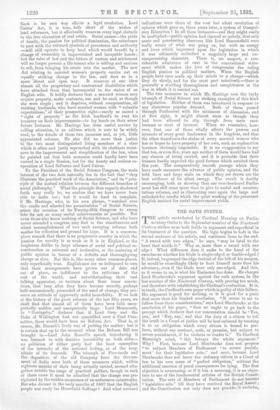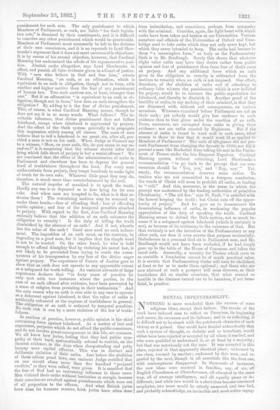THE OATH SYSTEM.
THE article contributed by Cardinal Manning on Parlia- mentary Oaths to the September number of the Nineteenth Century strikes us as both feeble in argument and superficial in its treatment of the question. His logic begins to halt in the second sentence of his article, and continues lame to the end. "A sword with two edges," he says, "may be fatal to the hand that wields it." Why so, more than a sword with one edge i What difference does it make to the hand of the swordsman whether his blade is single-edged or double-edged ? If, indeed, he grasped the edge instead of the hilt of his weapon, he would be exceedingly likely to hurt himself more than his adversary, even if the blade were only one-edged. And this, as it seems to us, is what his Eminence has done. He charges Lord Sherbrooke's argument against the oath system, in the last number of the Nineteenth Century, with proving too much, and therefore with establishing the Cardinal's contention. It is, in truth, the Cardinal's own paper which is guilty of this fallacy. His argument is good for nothing, or it is good for a great deal more than his limited conclusion. "It seems to me to follow from these considerations," says Lord Sherbrooke, at the conclusion of his paper, "that we ought to go back to the precept which declares that our conversation should be 'Yea, yea,' and 'Nay, nay,' and that the duty of a citizen to tell the truth in a Court of justice will be best enforced by treating it as an obligation which every citizen is bound to per- form, without any contract, oath, or promise, but subject to severe punishment, if he violates or-evades it." To Cardinal Manning's mind, " this betrays the whole argument."
Why First, because Lord Sherbrooke does not propose "to subject Members of Parliament 'to severe punish- ment ' for their legislative acts ;" and next, because Lord Sherbrooke does not leave the ordinary citizen in a Court of law to his own sense of "perfect obligation," without the additional sanction of penal consequences for lying. The first objection is unmeaning, or if it has a meaning, it is an objec- tion' to one of the fundamental articles of the British Consti- tution. The acts of Members of Parliament do not become "legislative acts," till they have received the Royal Assent ; and the Constitution not only does not provide, it excludes, punishment for such acts. The only punishment to which Members of Parliament, as such, are liable "for their legisla- tive acts," is dismissal by their constituents, and it is difficult to conceive any other punishment which would be practicable. Members of Parliament must necessarily be left to the dictates of their own consciences, and it is no reproach to Lord Sher- brooke's argument that it does not meet unreasonable objections. It is by means of his second objection, however, that Cardinal Manning has undermined the whole of his argumentative posi- tion. Abolish oaths altogether, says Lord Sherbrooke in effect, and punish all false evidence given in a Court of justice. With "men who believe in God and fear him," retorts Cardinal Manning, "an oath, or an affirmation, which is equivalent to an oath in obligation, though not in form, adds another and higher motive than the fear of any punishment of human law. Two such motives are, at least, stronger than one." But if an affirmation "is equivalent to an oath in ob- ligation, though not in form," how does an oath strengthen the obligation ? By adding to it the fear of divine punishment. This, of course, is what Cardinal Manning means, though he does not say it in so many words. What follows ? The in- evitable inference, that divine punishment doss not follow falsehood, except when falsehood is aggravated by perjury. And the effect of the Oath system generally is to propagate this impression widely among all classes. The mass of men believe that to tell a falsehood is no great sin, after all, pro- vided a man is not on his oath. When Judge or Counsel say to a witness, "Now, on your oath, Sir, do you mean to say so- and-so ?" is it surprising that the witness should infer that lying which falls short of perjury is but a venial offence ? We are convinced that the effect of the administration of oaths in Parliament and elsewhere has been to depress the general level of truthfulness throughout the land. For every man oaths restrain from perjury, they tempt hundreds to make light of truth for its own sake. Whatever little good they may do, therefore, is much more than counterbalanced by the evil. The natural impulse of mankind is to speak the truth. Hardly any one is so depraved as to love lying for its own sake. And when men are tempted to lie, what is it that re- strains them ? The restraining motives may be summed up under three heads,—fear of offending God ; fear of offending public opinion • and fear of the temporal penalties attached to perjury. With regard to the first, does Cardinal Manning seriously believe that the addition of an oath enhances the obligation to veracity ? Is the duty of telling the truth diminished by the absence of an oath ? And if not, wherein lies the value of the oath ? Good men need no such induce- ment. The imposition of an oath must, on the contrary, be degrading to a good man, for it implies that his simple word is not to be trusted. On the other hand, he who is bold' enough to offend Almighty God by violating his moral law, is not likely to be prevented from trying to evade the conse- quences of his transgression by any fear of the divine anger against perjury. The experience of Courts of Justice goes to show that an oath does not operate to any appreciable extent as a safeguard for truth-telling. An eminent advocate of large experience declares that "in forty years of practice he only met with two instances where the parties, in the ease of an oath offered after evidence, have been prevented by a sense of religion from persisting in their testimonies." And the only reason why an oath is ever able in any case to operate as a deterrent against falsehood, is that the value of oaths is artificially enhanced at the expense of truthfulness in general. The obligation of an oath is enforced by temporal penalties. No such risk is run by a mere violation of the law of truth- fulness.
In matters of practice' however, public opinion is the chief restraining force against falsehood. As a matter of fact and experience, perjuries which do not offend the public conscience, and do not involve penal consequences in this life, are common. We all know how juries, feeling that they had public sym- pathy at their back, systematically refused to convict, on the clearest evidence, in the days when sheep-stealing and petty larceny were capital offences. This was in distinct and deliberate violation of their oaths. Just before the abolition of those odious penal laws, one eminent Judge certified that on one circuit alone more than five hundred "perjured verdicts," as they were called, were given. It is manifest that the fear of God had no restraining influence in those cases. Men violated their oaths without hesitation or scruple, because their consciences revolted against punishments which were out of all proportion to the offence. And what British juries have done for humane reasons, Irish juries have often done from intimidation, and sometimes, perhaps, from sympathy with the criminal. Consider, again, the light heart with which oaths have been taken and broken at our Universities. Various members and officials of the Universities of Oxford and Cam- bridge used to take oaths which they not only never kept, but which they never intended to keep. The oaths had become to them "a meaningless form," as truly as the Parliamentary Oath is to Mr. Bradlaugh. Surely this shows that whatever slight value oaths may have they derive rather from public opinion and fear of punishment than from fear of God's curse on perjury. And any additional force which an oath gives to the obligation to veracity is subtracted from the motives to veracity when an oath is not imposed. One effect, therefore, of the abolition of oaths and of attaching ft) ordinary false witness the punishment which is now inflicted for perjury, would be to increase the public reprobation for falsehood, and thereby to diminish it. Another proof of the Inutility of oaths, to say nothing of their mischief, is that they are dispensed with, without evil consequences, on various occasions. Witnesses examined before Parliament are not on their oath ; yet nobody would give less credence to such evidence than to that given under the sanction of an oath. Peers, moreover, are exempted from oaths in giving their evidence ; nor are oaths exacted by Registrars. But if the absence of oaths is found to work well in such cases, what reason is there to fear that it would work ill as applied to Members of Parliament ? The oath of allegiance did not pre- vent Parliament from changing the dynasty in 1688, nor did it prevent a man like Rochefort from taking his seat in the Parlia- ment of France under the late Emperor Napoleon. Cardinal Manning quotes, without criticising, Lord Sherbrooke's recommendation "to go back to the precept that our con- versation should be Yea, yea,' and Nay, nay.'" Yet, surely, the recommendation deserves some notice. To readers who are not committed to a foregone conclusion, the words of Christ will seem to prohibit all oaths, as leading to " evil." And this, moreover, is the sense in which the- precept was understood by the leading authorities of primitive Christianity. 66 The old law," says St. Basil, " is satisfied with the honest keeping the truth ; but Christ cuts off the oppor- tunity of perjury." And he goes on to demonstrate the demoralising influence of oaths, in weakening the popular appreciation of the duty of speaking the truth. Cardinal Manning seems to defend the Oath system, not so much be- cause it is a safeguard against falsehood (which it certainly ie not), as because of its testimony to the existence of God. But that certainly is not the intention of the Parliamentary or any other oath, nor does it even answer that purpose successfully. Disbelievers in a personal God sit in Parlianient now, and Mr. Bradlaugh would not have been excluded, if he had simply gone up to the table of the House of Commons and taken the usual oath. Assuredly, a security for Theism which rests on so unstable a foundation cannot be of much practical value. It is certain that Parliamentary Oaths will soon be abolished, at least so far as to make them optional ; and those who are now alarmed at such a prospect will soon discover, as their forefathers did on similar occasions, that what seemed so terrible in the distance turned out to be harmless, if not bene- ficial, in practice.































 Previous page
Previous page